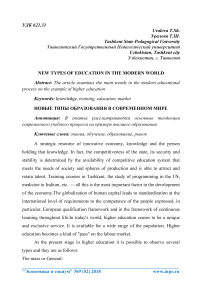New types of education in the modern world
Автор: Uralova T.Sh.
Журнал: Экономика и социум @ekonomika-socium
Рубрика: Основной раздел
Статья в выпуске: 9 (52), 2018 года.
Бесплатный доступ
The article examines the main trends in the modern educational process on the example of higher education.
Knowledge, training, education, market
Короткий адрес: https://sciup.org/140239780
IDR: 140239780
Текст научной статьи New types of education in the modern world
A strategic resource of innovative economy, knowledge and the person holding that knowledge. In fact, the competitiveness of the state, its security and stability is determined by the availability of competitive education system that meets the needs of society and spheres of production and is able to attract and retain talent. Training courses in Tashkent, the study of programming in the US, medicine in Indium, etc. — all this is the most important factor in the development of the economy.The globalization of human capital leads to standardization at the international level of requirements to the competence of the people expressed, in particular, European qualification framework and in the framework of continuous learning throughout life.In today's world, higher education ceases to be a unique and exclusive service. It is available for a wide range of the population. Higher education becomes a kind of "pass" on the labour market.
At the present stage in higher education it is possible to observe several types and they are as follows:
The mass or General:
-
1. Education becomes universal and accessible to different segments of the population;
-
2. Learning almost everything at any age (the transition to universal higher education in economically developed countries, education throughout life).
Commercial or paid:
-
1. The introduction of market relations, increase in the number of private educational institutions and paid forms of education at various levels;
-
2. The rising cost of educational services, increasing the share of spending on education in the total income of the population, prolongation of term of return of investment in education.
International :
-
1. Internationalization of curricula and programs, recognition of learning outcomes, developed in other countries;
-
2. International joint research;
-
3. The establishment of regional and international University networks;
-
4. International mobility of students and teachers to create a unique educational environment and formation of cross-cultural competences;
-
5. The export of educational services in various forms.
Information or remote:
-
1. Information technology is blurring territorial borders thanks to the Internet it has become possible to study virtual in foreign universities;
-
2. New technologies are replacing the classroom, libraries, laboratories, etc.;
-
3. Individual devices (smartphones, tablets) and applications personalizeduyj educational environment, make it mobile;
-
4. The content of the educational program (including content items, class records, alternative sources of information) becoming available to students and teachers at any time.
Globalization processes have changed the competition in the field of education: it gradually shifted from the local to the global level. The citizenship of the country, living in a particular region, training in a particular school was no longer sufficient for success and competitiveness. Thanks to the mooc (massive on-line open courses) a world-class education became available to all.
At the same time increased the prestige of foreign degrees in developing countries and countries with economies in transition, the process of "concentration of minds" in the world's leading universities.
Globalization manifests itself in the availability of information, its openness. However, available network information is redundant, unskilled user, which is the student, not always can assess its adequacy and quality. Therefore, an important now is the formation in the University the ability to learn, locate information, develop competence. First today comes the orientation of a person to further their own development, his desire and ability to constantly learn and accumulate knowledge, create competence. That's why there are a lot of reforms in the field of education. The basics of these reforms lies the direction of students to their own goals in the future.
Список литературы New types of education in the modern world
- Karpov V.Ye., Konkov K.A. Fundamentals of operating systems -M.: INTUIT.ru, 2004. -632 pp.
- Collis, B. Pedagogical Re-Engineering: A Pedagogical Approach to Course Enrichment and Re-Design with the WWW//Educational Technology Review


